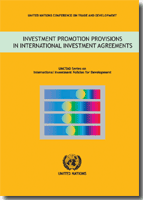
International investment agreements (IIAs) are an element of investment promotion strategies as contracting parties seek to encourage foreign investment through the granting of investment protection. Notwithstanding the great importance of a stable and predictable international legal framework for attracting foreign investment, existing IIAs might not live up to their full potential as regards their investment promotion objective.
Despite the fact that these agreements seek investment promotion and protection, their emphasis is clearly on the latter part with investment promotion primarily perceived as a side effect of investment protection. However, this effect - an increase in investment flows - remains often behind the expectations of the contracting parties.
A recent UNCTAD survey of IIAs shows that only a minority of IIAs includes explicit investment promotion provisions. Their content varies considerably among treaties. Promotion activities agreed upon in the IIA cover such diverse issues as measures to improve the overall policy framework for foreign investment or the granting of financial or fiscal incentives to individual investors. Promotion measures may cover all economic sectors or focus on specific economic activities. They may be limited to confirming the applicability of already existing promotion schemes of the contracting parties or provide for the setting up of new investment promotion instruments. They may address promotion activities of the home country or of the host country, and may likewise provide for joint activities. Investment promotion provisions may be stand-alone provisions or establish a follow-up mechanism to monitor their operation in practice. Finally, investment promotion provisions may be drafted as voluntary commitments or as legally binding obligations.
What option contracting parties finally choose depends on various factors. Countries that basically pursue a laisser faire policy with regard to foreign investment might favour promotion strategies aimed at improving the general policy and institutional framework, while governments applying strategic investment policies might have a preference for sector-specific or activity-specific promotion measures, or those aimed at fostering linkages between foreign investors and domestic companies. Financial considerations may also play a role, since many developing countries may not have the means to agree upon expensive promotion programmes, such as investment incentives, in IIAs.
Recent developments in the evolution of the IIA universe might be an indication that more countries are ready to explore new approaches in investment rulemaking. From a development perspective, it is worthwhile considering how to strengthen the investment promotion component in IIAs.



